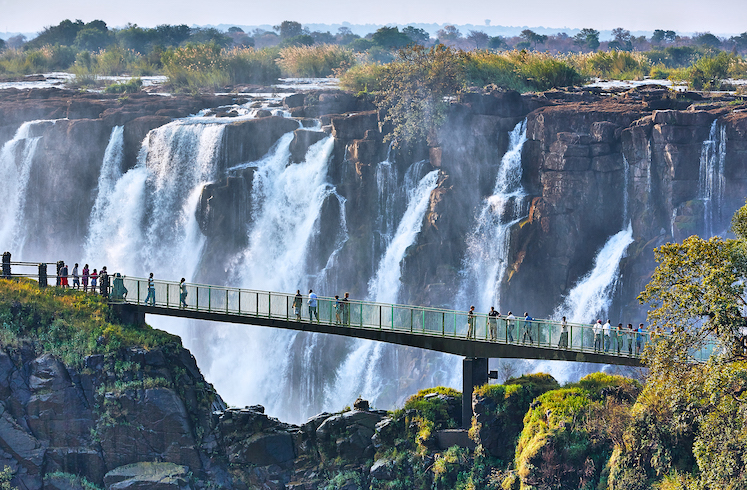Is it Ethical to Travel to Places With Low Vaccination Rates?
Checking vaccination stats and assessing the risks is vital before booking your next trip to ensure you’re not putting people in harm’s way.
 Photo © Peter Unger / Getty Images
Photo © Peter Unger / Getty Images
If you’ve dared dream where you’ll go next – or are already back into the swing of travel – the lure of foreign lands is hard to resist. For many of us, the joy of travel lies in tasting unfamiliar foods, gazing at views, and exploring cultures unlike our own – and it’s all waiting beyond our own country’s borders.
One in four pre-pandemic jobs were tied to tourism, the World Travel and Tourism Council tells us, so it makes sense that the countries we want to visit want us to visit, too … doesn’t it?
Sure, unless our visit ends up doing a destination more harm than good. Now is the time to ask what impact we might have when we travel, and whether it’s fair to travel to countries where the majority of the population hasn’t yet had the chance to be vaccinated.
The problem with vaccine inequity
If you’ve been vaccinated, you’re one of the lucky ones. You live in a country where COVID-19 vaccines are easily accessible. As of 5 October 2021, 6.2 billion doses have been administered around the world, and 26 million more are being jabbed into arms each day.
While 45 per cent of the global population has received at least one dose, just two per cent of people in low-income countries can say the same.
That number falls again for the fully vaccinated. According to Our World in Data, an organization building an international vaccination dataset, vaccine inequity is undeniable – the numbers speak for themselves.
In Tanzania, for example, just 1 per cent of the population is fully vaccinated, with Kenya not far behind at 1.6 per cent. In Jamaica and Bangladesh, around 10 per cent of people have received the two vaccinations they need to be protected from serious illness or death caused by COVID-19.
The picture looks very different in the world’s wealthiest countries, which are leading the charge in the percentage of people fully vaccinated: Portugal (85 per cent), UAE (83), Spain (78), Singapore (77), Denmark (75), Belgium (72), Canada (70). The UK, USA and Australia are sitting at 66, 55 and 43 per cent, respectively.
Improving vaccine rates
As wealthy countries reach high vaccination rates, policies inevitably shift from ‘zero-tolerance’ to ‘living with’ COVID-19. International borders open up, quarantine measures relax, and travel lovers fed up with staying home pack their bags and head for the nearest airport.
Low vaccine supplies (thanks partly to wealthy countries grabbing more than their fair share early on), manufacture and distribution hold-ups, and the cost and logistics of acquiring vaccines and administering them are all contributing to vaccine inequity.
September’s Global COVID-19 Summit was a collective step forward, as world leaders committed to accelerating access to vaccines, diagnostics and treatments to meet the World Health Organization’s target: that 70 per cent of all people in all countries be vaccinated by mid-2022.
NGOs are doing what they can too. UNICEF’s Give the World a Shot fundraising campaign aims to deliver 2 billion COVID-19 vaccines, 5.5 million treatments and 5.6 million test kits to countries in need; the WHO Foundation’s Go Give One is raising money to enable low- and middle-income economies to access donor-funded doses of safe and effective COVID-19 vaccines (some low-income countries have been resorting to low-efficacy vaccines because it’s all they’ve been able to get their hands on).
Protecting local communities
Supporting initiatives such as these is one way you can help, but you can also play a part in not making things worse. That’s one reason ethical tour operator Intrepid Travel requires all its travelers and tour leaders to be fully vaccinated.
“We’re taking this step because it’s important to us that we make sure the communities we visit, our leaders and our travelers are safe and that we minimize, as much as possible, anyone’s chances of traveling with and passing on COVID-19,” says Intrepid Travel CEO James Thornton. “We need to keep everyone safe. It’s as simple as that.”
Tourism-reliant countries who’ve been doing it tough have little choice but to welcome back travelers, no matter how few of their own people have been vaccinated.
It’s up to us to monitor and choose travel destinations carefully – for their sake and yours – and to do what we can to minimize mutual risk while we’re there.
“The bottom line is that regardless of how ‘pent up’ we feel to travel, it’s still a huge privilege to do so – we must be respectful of places and people and think about our impact before we even begin planning a trip,” says Skift global tourism reporter Lebawit Lily Girma.
The best way to protect local communities is simple, Girma says. “It’s unethical to travel to a low-vaccinated country and expose other people who haven't had the privilege of having access to vaccines." Girma goes even further by suggesting travelers should wait until the vaccination rate in the region or local community you’re interested in has reached at least 70 per cent.
How can you minimize the risk to others
Traveling for fun is one thing but traveling to be with family members from whom you’ve been separated is quite another. And the risks to others when you’re spending time with loved ones at their home is dramatically different to those posed during a sightseeing vacation or resort stay where you’re putting locals and tourism workers in jeopardy just by being there.
Although you can’t completely control the risk to yourself by traveling to a country of low vaccination/high infection rates, you can minimize your risk to them. Remember that even if you are fully vaccinated against COVID-19, you can still catch and pass on the virus.
- Get vaccinated before you travel
- Avoid crowded indoor settings with inadequate ventilation in favor of outdoor activities and dining venues
- Wear a mask in areas of high local transmission rates. Mask wearing on public transport and other crowded places makes good sense wherever you are
- Don't travel if you feel unwell or have any symptoms of COVID-19
- Get a negative COVID-19 test before traveling.
Infectious disease epidemiologist Dr Saskia Popescu discourages travel if you have recently been exposed to a COVID-positive case or aren’t feeling well, no matter how desperate you are to travel or reunite with your family. “We need to be good stewards of public health,” Popescu says.
If you travel anyway, your symptoms escalate and you need medical care while you’re away, burdening the local healthcare system does local people no favours.
Getting tested just before your departure may be inconvenient – especially if you test positive and need to delay your trip – but it’s the right thing to do.
If you’re not feeling well once you reach a low-vaccination destination but have only mild symptoms, self-isolating until you feel better, or test negative is the best way to protect the surrounding community.
Related articles
Simple and flexible travel insurance
You can buy at home or while traveling, and claim online from anywhere in the world. With 150+ adventure activities covered and 24/7 emergency assistance.
Get a quote
No Comments